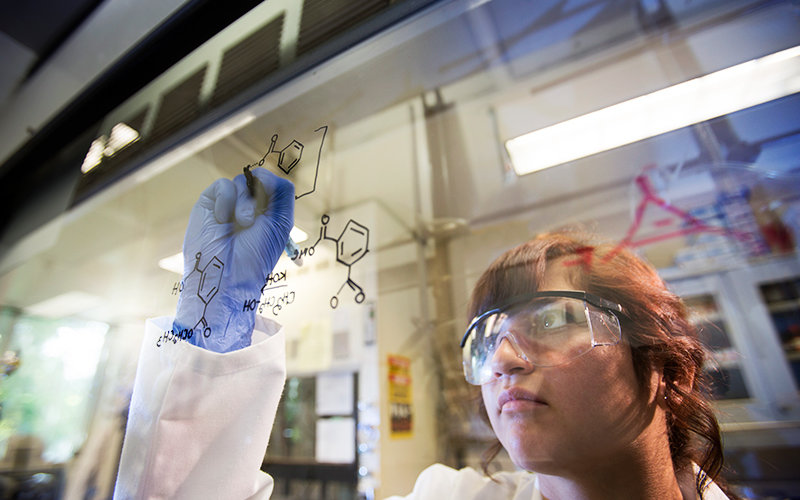
Cal State Fullerton has been awarded nearly $300,000 from the National Science Foundation for a two-year pilot project to scale up an existing program that provides a pathway for underrepresented community college students to earn bachelor’s degrees in science, technology, engineering and mathematics (STEM) fields at a four-year university.
The National Science Foundation this week issued its first-ever awards for the NSF INCLUDES (Inclusion across the Nation of Communities of Learners of Underrepresented Discoverers in Engineering and Science) program. It is a comprehensive initiative to enhance U.S. leadership in science and engineering by broadening participation in STEM. CSUF and San Francisco State are the only California State University (CSU) campuses to receive the grants.
CSUF’s project, (STEM)³: Scaling (STEM)² (Strengthening Transfer and Matriculation in STEM), will build on the University’s (STEM)² model, which has a proven track record and documented positive outcomes of graduating STEM transfer students with a bachelor’s degree, said Mark S. Filowitz, associate dean of the College of Natural Sciences and Mathematics and interim associate vice president for academic operations, who is directing the project.
“In this project, we target low-income and traditionally underrepresented community college students who have already expressed interest in STEM careers and we seek to improve the rates at which they persist in higher education, transfer to four-year institutions and eventually enter the STEM workforce,” said Filowitz.
Data show that Hispanic students, in particular, are well represented at local two-year colleges, but less well-represented among STEM bachelor’s degree recipients. “In fact, according to the literature, almost 70 percent of Hispanic students begin their higher education in a community college, but less than 10 percent go on to a complete a four-year degree,” he added.
Collaborators on the pilot project, in which CSUF was awarded $299,263, are Susamma Barua, interim dean of the College of Engineering and Computer Science; Maria V. Dela Cruz, (STEM)² project director; and Michael Loverude, professor of physics and director of the University’s Catalyst Center for the Advancement of Research in Teaching and Learning Math and Science. CSUF also will partner with Cal Poly Pomona and Citrus College to demonstrate that the model developed at CSUF can work at another CSU campus, with the long-term vision to replicate the model across the CSU, Filowitz said.
The (STEM)² program was launched on campus in 2011 with a five-year, nearly $6 million grant from the U.S. Department of Education. The program was designed to retain students in these fields, produce more community college STEM transfers to four-year institutions and, ultimately, boost the number of Hispanic and low-income students attaining STEM baccalaureate degrees. Cypress College, Citrus College and Santiago Canyon College partnered with CSUF in the highly successful program, directed by Dela Cruz.
Through summer of 2015, the (STEM)² program provided summer research experiences to 139 students from two-year colleges, 76 percent of whom had already transferred to a four-year university in fall 2016 to continue their STEM degree. Additionally, the (STEM)² Academic Transition Program has served more than 200 STEM students who have higher persistence rates and maintain more stable GPAs compared to non-participating students, noted Filowitz.